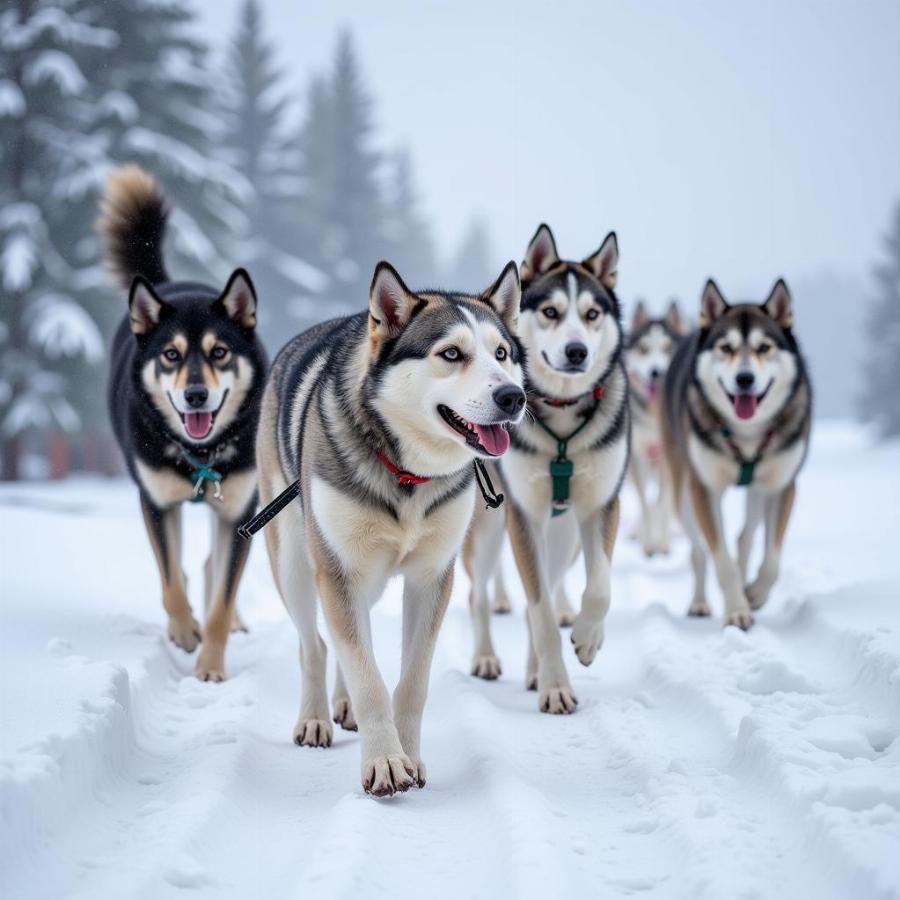Barrel chest dogs are easily recognizable by their unique physique, characterized by a deep, wide chest that resembles the shape of a barrel. This distinctive feature isn’t just for show; it plays a crucial role in their overall health and athleticism. This article delves into the fascinating world of barrel chest dogs, exploring the reasons behind their body shape, the breeds that commonly possess it, and what you need to know as a potential owner.
What Causes a Barrel Chest in Dogs?
A dog’s chest shape is primarily determined by the structure of their rib cage. Barrel chest dogs have well-sprung ribs, meaning their ribs curve outward from the spine and then sweep back towards the breastbone, creating a spacious chest cavity. This anatomical design serves a vital purpose, particularly in breeds originally bred for endurance and strength.
The Benefits of a Barrel Chest
The spacious chest cavity in barrel chest dogs allows for larger lung capacity. This enhanced lung volume enables them to take in more oxygen with each breath, which is essential for sustaining prolonged physical activity.
Think of it like this: imagine a marathon runner versus a sprinter. The marathon runner, needing sustained energy, would benefit from larger lungs to fuel their body over long distances. Similarly, barrel chest dogs, historically bred for tasks like herding or sledding, rely on their superior lung capacity for stamina and power.
 Sled Dogs in Action
Sled Dogs in Action
Common Barrel Chest Dog Breeds
While the term “barrel chest” might evoke images of large, powerful breeds, it’s important to note that this anatomical trait is found in dogs of various sizes. Here are some examples:
Large Breeds:
- Bulldog: Known for their stocky build and signature “smile,” Bulldogs are a classic example of a barrel chest breed.
- Rottweiler: These intelligent and powerful dogs possess a broad chest that contributes to their imposing presence and physical strength.
- Siberian Husky: Bred for sledding in harsh arctic conditions, Siberian Huskies rely on their barrel chests for exceptional endurance.
Medium Breeds:
- English Springer Spaniel: These energetic sporting dogs require ample lung capacity for hunting and fieldwork.
- Border Collie: Renowned for their herding instincts and boundless energy, Border Collies benefit from a barrel chest for sustained activity.
Small Breeds:
- French Bulldog: Their compact yet muscular build often includes a noticeable barrel chest.
Special Considerations for Barrel Chest Dog Owners
Owning a barrel chest dog comes with specific responsibilities. Understanding their unique needs and potential health concerns is crucial for responsible pet ownership:
- Exercise: These dogs thrive on regular physical activity. Daily walks, runs, or play sessions are essential to keep them happy and healthy.
- Bloat: Due to their deep chests, barrel chest breeds are predisposed to bloat, a life-threatening condition where the stomach twists.
- Diet: Feeding your barrel chest dog several small meals a day, rather than one large one, can help mitigate the risk of bloat.
Living with a Barrel Chest Dog: A Rewarding Experience
Barrel chest dogs, with their distinctive physique and endearing personalities, can make wonderful companions. By understanding their unique needs and potential health concerns, you can provide them with a loving and fulfilling life. Remember, responsible pet ownership involves careful consideration of breed-specific traits and proactive care to ensure the well-being of your furry friend.
FAQs about Barrel Chest Dogs:
Q: Are barrel chest dogs more prone to breathing problems?
A: While their large lung capacity is beneficial for endurance, some barrel chest breeds, particularly those with brachycephalic (short-nosed) features, might be more susceptible to breathing difficulties.
Q: Do all barrel chest dogs require the same amount of exercise?
A: Exercise needs vary depending on the breed, age, and overall health of the dog. Consult with your veterinarian to determine an appropriate exercise regimen for your furry companion.
Q: How can I tell if my barrel chest dog is experiencing bloat?
A: Signs of bloat include a distended abdomen, restlessness, excessive drooling, and unsuccessful attempts to vomit. Seek immediate veterinary attention if you suspect your dog is experiencing bloat.
Explore More About Dog Breeds and Care
- [Link to an article about bloat in dogs]
- [Link to an article about dog exercise requirements]
Beaut Dogs: Your Trusted Source for Dog Information
Beaut Dogs is your go-to resource for all things dog-related, offering reliable, insightful, and in-depth information about the world of canine companions. From breed-specific insights to expert guidance on care, we’re here to support you in providing the best possible life for your furry friend. For personalized assistance and expert advice, reach out to us at [email protected].